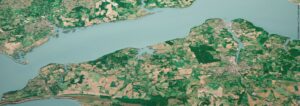Finding a way to finance nature
16th January 2023
Markets for carbon, biodiversity and other environmental services are widely expected to grow in the coming years. But given the infancy of such markets, there is still tremendous uncertainty about how they will operate. To help address such concerns, Ecosystems Knowledge Network (EKN), a UK-wide independent knowledge hub, is undertaking a review to understand the opportunities and challenges associated with nature finance.
The review, which will include a survey and consultation and will be repeated annually, aims to provide a UK-wide view of this area of enterprise. It is designed to help nature projects and those wishing to support them.
The term ‘nature finance’ describes the emerging opportunities for those who look after land, water and nature to attract new sources of revenue and investment from these markets and other private sources, says Henry Crabb, nature-based finance specialist at EKN.
“Currently, we have little idea of the growth of projects engaged in nature finance,” he explains. “In what some call the ‘wild west’, there are clearly opportunities, but their procurement has been unclear and projects are often working in isolation beyond national grant support.”
However, with mandatory requirements for nutrient neutrality and biodiversity net gain, the once mythical ‘stacking’ of saleable ecosystem services is now attainable, says Mr Crabb. “At least 70 investment readiness (capacity of an enterprise to understand and meet the specific needs and expectations of investors) projects are already under way across England, with numerous others elsewhere across the UK. They are all looking for ways to harness opportunities for revenue and investment.
“The endeavour could drive a thriving new dimension of rural enterprise, delivering on the promise of nature-borne triple-win outcomes for business, communities and climate. The problem is that, at present, we have little idea of the growth of these markets.”
To gain a better understanding of the current opportunities and challenges to project development, EKN will be carrying out a campaign from 12 January to 10 February. Its 5-10 minute survey will cover the types of revenue stream under consideration, steps towards investment readiness, and the sort of organisations involved.
It aims to review the state of the nature finance project pipeline in the UK, and will monitor opportunities and challenges to project development in subsequent reviews.
It will also help to understand the avenues through which projects can secure private finance to complement philanthropic or public revenue. In addition, it will evidence annual progress made by project developers to access nature finance to deliver social and environmental objectives.
As well as the survey, there will be consultations with public, philanthropic, third and voluntary sectors and community-based initiatives.
A report, the 2023 Nature Finance Review, will be published in April, bringing together the survey and consultation work.
“We need to figure out the challenges and gaps and help prospective and existing projects to understand the opportunities,” says Mr Crabb. “There has been so much uncertainty concerning the Environmental Land Management scheme. Some farmers are not engaging until they have clarity, but others are acting and benefiting in areas like nutrient mitigation, biodiversity net gain and carbon storage. And we are ready to help champion what they are doing.”



